- Home
- Alex Scarrow
Plague Nation Page 3
Plague Nation Read online
Page 3
Someone else.
‘Here,’ Freya said, handing him a bowl and a spoon. She settled down on an armchair, snaked her feet back into the open mouth of the sleeping bag and worked it up her legs to her knees.
‘Thanks.’
‘So now we know for sure there are others,’ she said, smiling. ‘I knew there had to be. I bloody well knew it.’
‘With ships . . . and meds and supplies.’ Leon dipped his spoon into the can, gave it a quick stir then scooped out several spoonfuls of the thick broth into his bowl. ‘An organized relief effort. Jeez . . . about time.’
‘That announcer on the radio sounded American to me.’
Leon nodded. ‘Maybe they managed to ride it out over there. Maybe they had a contingency plan.’
‘Unlike our useless government over here.’ She helped herself to the stew in the can. ‘And then there’s the question of who wrote this,’ she added, nodding at the piece of paper lying on the floor between them.
Leon looked down at the note. He wondered when someone had last poked their head into the studio. A few weeks ago? A few months? A year ago? Two? There was no way of knowing how old the note was. It could have been scribbled down an hour before they arrived, or a few days after the outbreak.
‘September the first. There’s no year with that date, Freya. This could be old, old news.’
‘Or it could be current news. It’s still broadcasting.’
He sighed. ‘It could be the same situation as the BBC place . . . some old generator running on fumes somewhere, beaming out a message that isn’t, you know, current any more.’
Freya tested the heat of the stew cautiously with her finger. Her lips were permanently numb, no sensation from them whatsoever. She could burn her lips and not even know it.
Another wonderful symptom of her encroaching sclerosis.
‘Leon, that’s what I like about you . . .’ She huffed.
‘What?’
‘The eternal optimist.’
‘Huh?’ He looked up, confused.
‘Sarcasm,’ she clarified. ‘You’re definitely the glass-half-empty type, aren’t you?’
He was going to reply that he just didn’t want them to raise their hopes. They’d been camping out in this small apartment for about fourteen months now, watching one winter come and go and another one come along straight behind it. They were slowly eating their way along the supermarket shelves below, creating gaps that were getting bigger, making it easier and easier for them to figure out how much longer the rest of those tins were going to keep them going.
Another two years. Maybe three.
Then what? A move to another place above another supermarket . . . to exist in bleak isolation, watching snow cover the rooftops in the winter and nettles cover the streets in the summer. Not living, not really – just existing, becoming urban wildlife.
A pair of lonely scavengers.
He pressed a smile into service to match up with the hopeful look on Freya’s face. ‘On the other hand, you might be right.’
She was always upbeat, always optimistic . . . stronger – mentally far stronger than he was. He wondered if he’d even be alive right now if it wasn’t for her.
Probably not.
‘We can’t stay hiding here forever, Leon.’ She chewed her food carefully, slowly, then finally she spoke again. ‘There’s nothing to hide from, anyway. It’s all gone. There’s nothing out there. Literally.’
‘We’re going to run out of butane before we run out of food. And what if there’s another winter like this one again next year? And the next? If this is how the climate’s going to be from now on, one day we’re going to freeze to death.’
‘You’re suggesting we act on this?’ he asked, tapping the sheet of paper on the floor. ‘You want to trek all the way up to Southampton?’
‘Down, actually. It’s south, not north. But . . . yes.’
‘What if it’s nothing? What if whoever recorded that message never even shows up? What if they died two years ago?’
‘And what if it’s something? What if we sit here like a pair of muppets and they do come and we could have been rescued if we’d bothered to get off our arses and go see?’
He nodded. Somehow, dying because of not doing something seemed worse than dying because of doing something. She had a point.
‘And, apart from the cold, what’s out there? The virus?’ She hunched her shoulders. ‘Unless the virus is tucked up somewhere with a camping heater and a sleeping bag, I’d say it’s frozen. Properly dead and gone.’
He looked again at the scribbled page. ‘September . . . that’s, what, six months from now?’
She nodded. ‘We could wait out here for a few more weeks. Wait for the snow and the roads to clear . . . Hey, we might even find a car that’s still working.’
‘How far away is Southampton?’
‘I dunno . . . gimme a sec and I’ll check on Google.’ She laughed at her own amazing wit.
He looked down at his food and stirred the congealing gravy. Another couple of minutes and it was going to have a skin. He heard the chair creak and her sleeping bag rustle as she leaned forward.
She placed a hand tenderly on his. ‘Do you want to go home, Leon? Back to America?’
Home. Home had once been New York. It certainly hadn’t been London, not even with Mum and Grace trying their hardest to make a new start.
But they’re gone, MonkeyNuts. Very . . . very . . . gone.
‘Maybe your dad’s still alive over there somewhere?’ She squeezed his hand. ‘Maybe I’ll even get to meet him?’
He snorted. ‘My dad’s a selfish pr . . .’
Is? Or was?
‘He sounds like a total kick-ass from what you’ve told me about him.’
‘You’ve got that about half right.’
CHAPTER 5
Two Years Ago
Tom Friedmann watched the grey Atlantic skimming beneath them, the darker outline of the New Jersey coastline slipping out of frame from the helicopter’s small porthole window.
Doug had delivered on his promise. No man left behind.
Despite what he’d begun to feel in recent years about his old squad buddy – that he was a ruthless user and discarder of people, a manipulator, a Washington shark through and through, quite probably a corrupt one too – if the guy made a promise, the guy damn well kept it.
He looked around at the soldiers he was sharing the helicopter’s cramped cabin with: five men, boys, really, not much older than Leon. And they all seemed terrified. The only things that kept them from looking like a bunch of spooked-out frat boys were their uniform and their quiet, firm belief that blindly obeying orders was going to save their lives.
Jesus Christ.
He checked his phone. No signal, of course.
What am I doing?
Why the hell am I here?
He’d panicked. He’d called Doug for a save-my-ass favour. Now here he was. But, really, he needed to be on a plane, one heading east to England. To his kids.
Jesus. He closed his eyes.
He was clutching at straws of hope here. That maybe the infection wasn’t as advanced in the UK as it had been here. Maybe Jenny had managed to get the kids to her parents’ house safely. That would be a good place for them to lie low – in the countryside, out on its own on that back road. They kept a larder full of canned goods there. He was pretty sure they had a clean freshwater stream at the end of their garden. Her dad had an old vintage shotgun that he potted clay pigeons with. It was fantastically inaccurate, but it made a big scary bang. Her mother had a sharp-edged tongue that could cut a man at ten paces. They’d be far better sitting tight there than stuck in the middle of London.
He was clutching his straws very tightly.
Also . . . so maybe this outbreak dies out quickly too.
His knowledge of epidemiology came from one page of a FEMA pamphlet and a bunch of Netflix box sets, but one thing he knew wasn’t movie-script BS was that a fastacting
virus was its own worst enemy. Killing your host wasn’t a smart move. Whatever this was, wherever it had come from, it was going to be history within weeks or months. Surely.
And then, Tom, old son, there’ll be the goddamn aftermath.
Millions dead. Hundreds of millions, perhaps even billions.
Collapsed infrastructure. Supply networks compromised. Unstable government systems. Some countries will cope with this far better than others. Mostly the Third World nations. Rural ones. China for example. Maybe even Russia too.
There’ll be chaos. Instability. Opportunistic land and resource grabs.
Shit. And where the hell does that take us all? Sabre-rattling, toe-to-toe posturing.
Where does that end up? Nukes.
Tom opened his eyes again and realized his mind was racing too far ahead. All those kinds of worries were for presidents and cabinets in a couple of months’ time, and God help them if they made the wrong decisions.
His worries were immediate: his two kids and his ex-wife stuck in the middle of the Norfolk countryside . . . hopefully.
CHAPTER 6
Leon stared at the driveway, flanked on either side by small granite pillars topped with a pair of wind-worn and weathered stone elephants. Waist-high brambles sprouted from the driveway in confident clumps, and either side of the long driveway the overgrown lawn poked through the melting snow.
‘This is it . . . I remember these old pillars and the stone elephants.’
‘Your grandparents rich or something?’
He shrugged. ‘I dunno. I guess, kind of.’
At the end of the driveway he could see the white walls, dark wooden beams and the thatched roof of his grandparents’ home. He remembered his last visit, four years ago. He’d been thirteen, Grace a precocious nine, and Mum and Dad had still seemed fine with each other then.
‘Well? We going in?’ asked Freya.
Leon nodded. He put the Ford Transit into first gear and gently rolled forward up the driveway, flattening the sporadic and over-confident bramble stalks with a sense of satisfaction.
The driveway’s not yours yet.
To the right was the pond, still mostly frozen over, a moss-flecked statue of Cupid beside it, worn hands placed strategically for modesty. To the left stretched a high mesh surrounding a snow-covered tennis court.
He recalled playing tennis on there with Grandma. She, in her early eighties and with bad knees, had thrashed him easily in a one-set match. He remembered he’d hurled his tennis racket down in a fit of petulant unsportsmanlike rage and had stormed off, leaving Grandma all alone, calling after him to come back so she could show him how to stop slicing the tennis balls right out of the court.
Leon winced at the memory.
Just one among many things he wished he could go back in time and redo. Their last visit had been one fortnight-long sulk for him. He’d missed his mates, missed having access to any wifi (all his grandparents had was one of those ancient dial-up modems) and he’d felt utterly overshadowed by Grace who’d been on a total charm offensive: all best behaviour and beaming smiles for Grandma and Grandad.
His grandparents had been gracious, patient and understanding with him, and he’d been a total tool, hinting unsubtly that he preferred his dad’s parents.
‘Do you think anyone’s home?’
Leon couldn’t see any woodsmoke coming out of the chimney. In all likelihood they weren’t home, and, if they were, the chances were that they’d be nothing but bones, rags, false hips and dentures.
It had been his idea to call in on their way south. Something he’d wanted to do. It was a few winding kilometres off the road they were on anyway, too temptingly close to not at least look in. Though he was beginning to wish he hadn’t chosen the detour now. The place looked bleak and lifeless, the mature oak trees like looming skeletons.
He pulled up outside the front door and beeped the horn hopefully.
‘Leon? You know they’re most likely . . . ?’
‘I know.’ He opened his door and stepped down into wet, mushy snow. Freya climbed out her side and came round the front. She stumbled and cursed.
‘You OK?’
‘Frikkin tripped on something.’ She kicked aside the wet snow and revealed the knuckle of a gnarled old tree root poking up through the gravel and slush. ‘Mother Nature doing her bloody-minded “This Is All Mine Now” thing.’ She joined him standing before the dark oak front door.
‘You really sure about this?’
‘I’ve got something I want to do.’
‘What?’
‘Just a . . . stupid thing. An errand.’
He reached for the large wrought-iron knocker and the heavy door creaked inwards at his touch. He stepped forward into the entrance hall beyond. It was dark with wood panelling and still smelt faintly of linseed oil. The smell filled him with hope for some reason. He almost called out ‘Grandma? Grandad?’ but stopped himself.
It felt wrong.
Face it. They’re gone. You know what you’ll find, Leo. Right?
He knew.
Just making sure you’re prepared, MonkeyNuts, that’s all.
Freya joined him inside and Leon led the way into the heart of the house, Grandma’s pride-and-joy country-house kitchen. Pots and pans hung in order of size from hooks, gently bumping and clanking in the breeze that stole in behind them. The large kitchen table was set for breakfast as it always was: marmalade, jam and Marmite in pots in the middle, and a china teapot ready and waiting beside them.
Leon could see them all sitting around it now: beams of coloured sunlight streaming in through the stained-glass kitchen window catching dust motes drifting lazily; classical music playing from one of those old record players sitting on top of the chest in the corner; Dad and Grandad exchanging headlines from their very different newspapers; Mum, Grace and Grandma discussing their plans for the day.
And Leon . . . sulking . . . again . . . over his Coco Pops.
Oh jeez. I was a total brat last time we came here.
He felt Freya’s hand on his shoulder. ‘You OK?’
‘Yeah, fine.’
She touched his cheek lightly and held her wet finger out for him to see. ‘Really?’
Self-consciously he swiped at his face with the back of his hand. ‘Just . . . you know . . . nostalgic shit an’ stuff.’
She nodded. ‘I know. What do you want to do?’
‘You stay here. I’m just going to have a quick look for them.’
‘You sure that’s a good idea?’
‘There won’t be much left. I . . . I just want to say goodbye.’
‘Go on.’ She waved him off, then eased herself down on to one of the kitchen chairs.
He found them as he’d hoped he’d find them. Upstairs. A brief glance into their bedroom was all he needed to work out how they’d chosen to leave things. Their bones were spooned up close together beneath a darkly stained and rotting quilt. On their bedside tables were empty water glasses and a motley collection of little brown pill bottles.
Leon couldn’t help a slight smile. Good for you, guys.
Bodies were a grim sight that had become all too familiar for him and Freya. Every home, every building, every street, the same bundles of bones and rags like kindling wrapped in tarp. But it was the skulls he couldn’t get used to: the sightless dark round orbits where eyes had been and the permanent snaggle-sneer of exposed teeth. Mercifully, right now, he could only see the backs of his grandparents’ heads. Tufts of snow-white hair still anchored to their skulls.
They died snuggling up together.
‘I’m sorry for being a complete asshole, Grandma,’ he said softly.
He unzipped his backpack and reached into it. He pulled out his journal, the leather cover dog-eared and scuffed, and set it down gently on their dressing table. ‘If Dad . . . ever, you know, drops by, can you tell him it’s right here?’
In answer, he heard the creak of a door somewhere out on the landing. He wanted to believe the
noise was Grandma’s ghost doing her best to tell him he was forgiven.
Of course I will, Leo . . . and, don’t worry, I’m well aware that teenagers have tantrums!
Or perhaps even the ghost of his dad, urging him to get going.
Go on, MonkeyNuts. Go catch that ship before she sets sail. I’ll read this later, buddy.
‘You found them?’
Leon nodded as he led the way out of the kitchen, into the entrance hall and back through the wide-open front door into the snow.
‘I’m so sorry,’ she replied.
‘Hey, it’s OK.’ He pulled the driver-side door open and climbed in. ‘I knew they were going to be dead anyway. At least now I know for sure.’
‘Did you manage the errand you wanted to do?’
He turned the ignition key and the van coughed and rattled to life. ‘Yeah.’
‘What was it?’ She looked at him and then quickly had a change of heart and shook her head. ‘My bad. Private. I’m sorry. I’m too bloody nosy for my own good.’
‘It’s OK. Just saying goodbye to ghosts and all that.’ He turned the van round and drove back down the driveway, swerving slightly to flatten the bare bramble stalks once again for good measure.
The noise of the van dwindled away to nothing, leaving the snow-covered gardens and driveway in silence. Silence . . . except for the creaking of bare tree limbs as they swayed in the modest breeze, and a sporadic hiss and patter as clumps of sun-softened snow slipped from the branches like ripe fruit, cascading down in light powder showers.
The snow had been thick this second winter. Thicker than the last one. From the middle of October until now, it had lain in deep drifts across the entire country. An unending carpet of white across fields and woods and urban landscapes. Rooftops no longer leaking heat, cities and towns no longer warmed by movement and industry now as white and picturesque as a Dickens postcard.
The morning sun crept across the garden, coaxing the violet-coloured shadows beneath the trees and bushes, making the snow sparkle and glitter. Before the creaking oak front door of the house the deep ruts from the van’s wheels cleaved through the snow.
And, there, the knuckle of the gnarled tree root Freya had exposed, emerging from the gravel like the gliding hump of a whale from a becalmed sea.

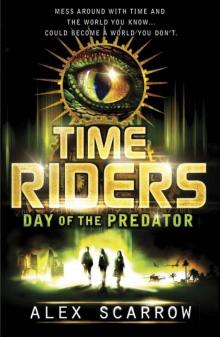 Day of the Predator
Day of the Predator Ellie Quin Book 3: Beneath the Neon Sky
Ellie Quin Book 3: Beneath the Neon Sky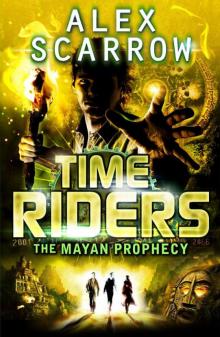 The Mayan Prophecy
The Mayan Prophecy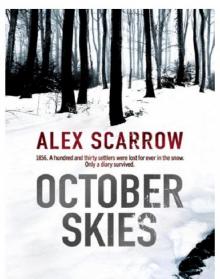 October Skies
October Skies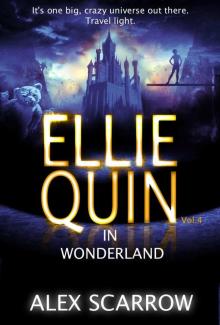 Ellie Quin Episode 4: Ellie Quin in WonderLand (The Ellie Quin Series)
Ellie Quin Episode 4: Ellie Quin in WonderLand (The Ellie Quin Series)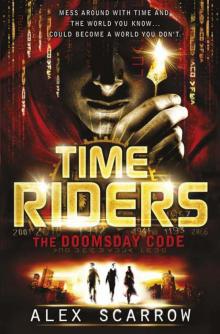 Time Riders
Time Riders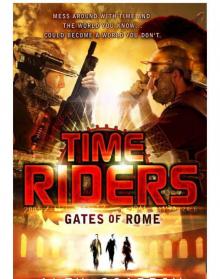 Gates of Rome
Gates of Rome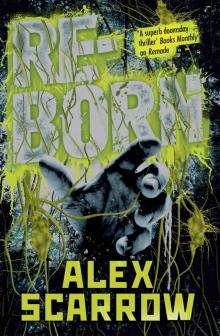 Reborn
Reborn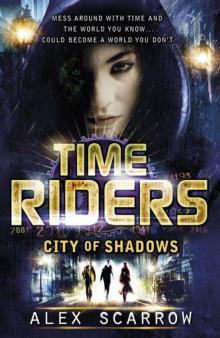 City of Shadows
City of Shadows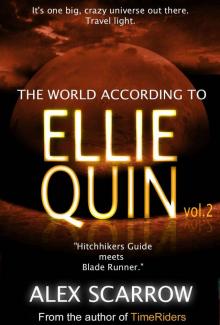 Ellie Quin Book 2: The World According to Ellie Quin (The Ellie Quin Series)
Ellie Quin Book 2: The World According to Ellie Quin (The Ellie Quin Series)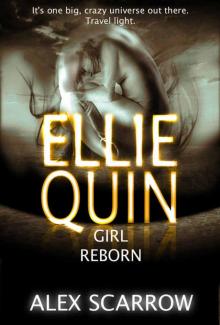 Ellie Quin Episode 5: A Girl Reborn
Ellie Quin Episode 5: A Girl Reborn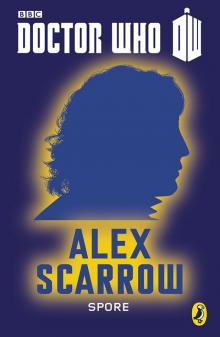 Spore
Spore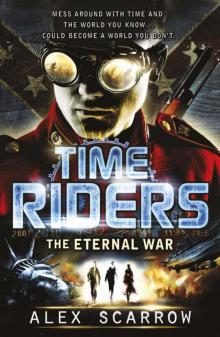 The Eternal War
The Eternal War Last Light
Last Light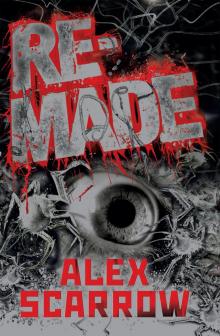 Remade
Remade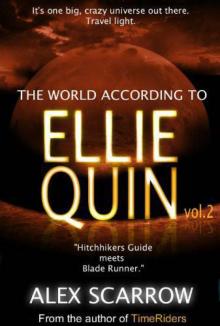 Ellie Quin Book 2: The World According to Ellie Quin
Ellie Quin Book 2: The World According to Ellie Quin Ellie Quin Book 3: Beneath the Neon Sky (The Ellie Quin Series)
Ellie Quin Book 3: Beneath the Neon Sky (The Ellie Quin Series)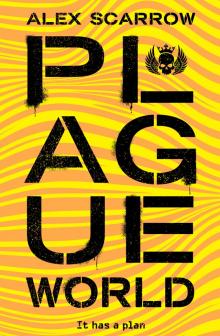 Plague World
Plague World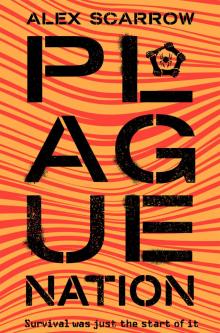 Plague Nation
Plague Nation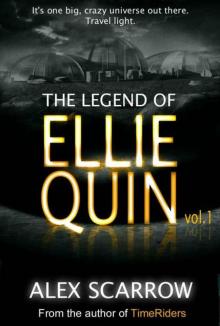 Ellie Quin Book 01: The Legend of Ellie Quin
Ellie Quin Book 01: The Legend of Ellie Quin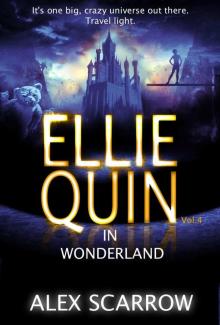 Ellie Quin - 04 - Ellie Quin in WonderLand
Ellie Quin - 04 - Ellie Quin in WonderLand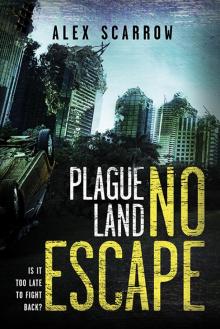 No Escape
No Escape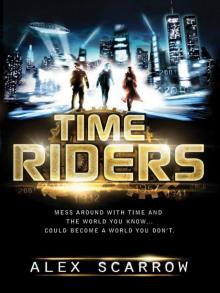 TimeRiders
TimeRiders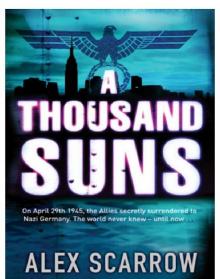 A Thousand Suns
A Thousand Suns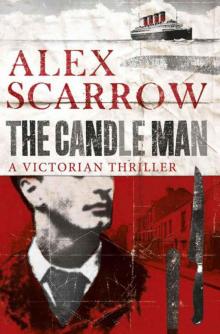 The Candle Man
The Candle Man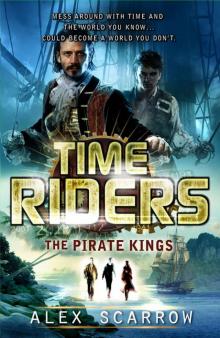 The Pirate Kings
The Pirate Kings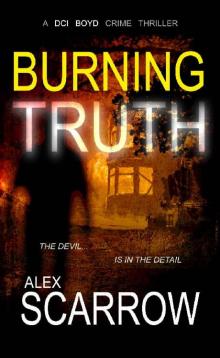 Burning Truth: An Edge-0f-The-Seat British Crime Thriller (DCI BOYD CRIME THRILLERS Book3) (DCI BOYD CRIME SERIES)
Burning Truth: An Edge-0f-The-Seat British Crime Thriller (DCI BOYD CRIME THRILLERS Book3) (DCI BOYD CRIME SERIES)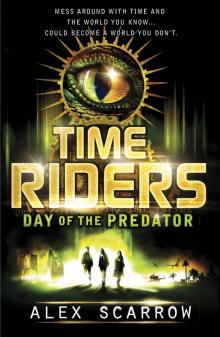 Day of the Predator tr-2
Day of the Predator tr-2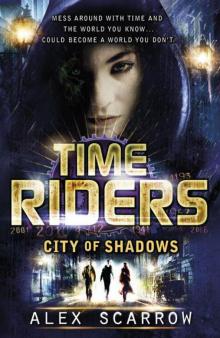 City of Shadows tr-6
City of Shadows tr-6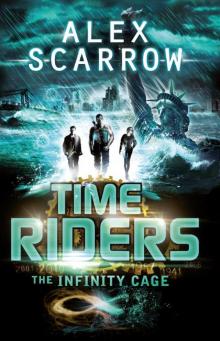 TimeRiders: The Infinity Cage (book 9)
TimeRiders: The Infinity Cage (book 9)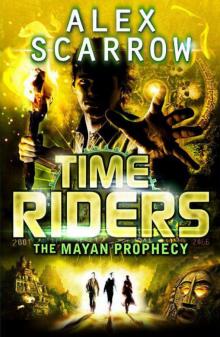 The mayan prophecy (Timeriders # 8)
The mayan prophecy (Timeriders # 8)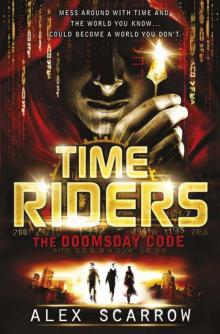 TimeRiders: The Doomsday Code (Book 3)
TimeRiders: The Doomsday Code (Book 3)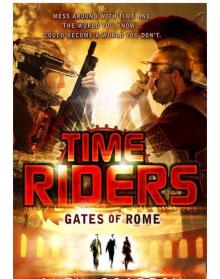 Gates of Rome tr-5
Gates of Rome tr-5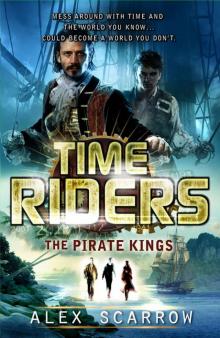 TimeRiders: The Pirate Kings (Book 7)
TimeRiders: The Pirate Kings (Book 7)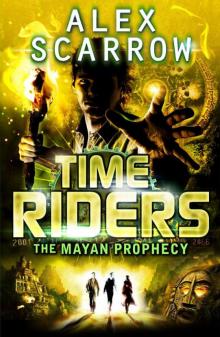 TimeRiders: The Mayan Prophecy (Book 8)
TimeRiders: The Mayan Prophecy (Book 8)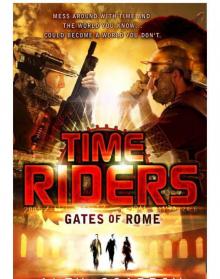 TimeRiders 05 - Gates of Rome
TimeRiders 05 - Gates of Rome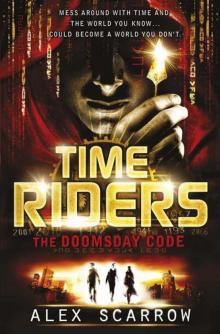 The Doomsday Code tr-3
The Doomsday Code tr-3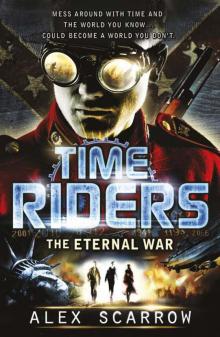 The Eternal War tr-4
The Eternal War tr-4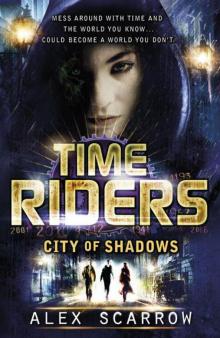 TimeRiders: City of Shadows (Book 6)
TimeRiders: City of Shadows (Book 6)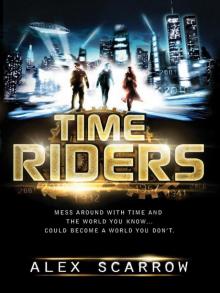 Time Riders tr-1
Time Riders tr-1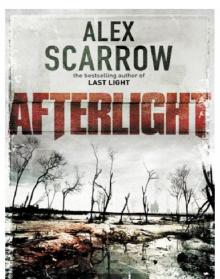 Afterlight
Afterlight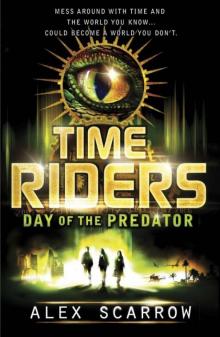 TimeRiders, Day of the Predator
TimeRiders, Day of the Predator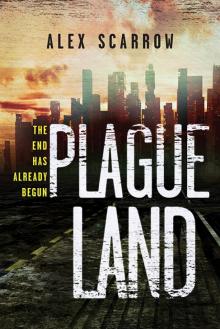 Plague Land Series, Book 1
Plague Land Series, Book 1